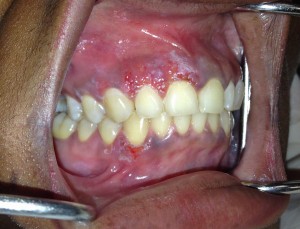25 y/o F with multiple painful lesions of the right gingiva and low grade fever. The symptoms started off as a stinging sensation with sensitivity to the gums on her right side that she noticed 3 days ago, but now there are lesions that hurt to touch, especially when brushing teeth. She has never had this before. On exam you see the above lesions, and there is mild submandibular lymphadenopathy on the right side.
Differential diagnosis: Acute necrotizing ulcerative gingivitis (ANUG, aka trench mouth), erythematous lichen planus, lichenoid reaction, erythematous candidiasis, aphthous ulcer, recurrent herpes simplex, mono
ANSWER: recurrent HSV
The exam shows coalescing crops of vesicles on an erythematous base, and the history gives you an important clue regarding the neuro-like prodromal symptoms (tingling/stinging).
The incidence of herpes labialis (cold sore/fever blister) is 1.6 per 1000 patients per year and its prevalence is 2.5 per 1000 patients per year — about 1/3 of affected individuals will suffer relapses. The relapses may affect gingival mucosa and are easy to misdiagnose if located in a less visible area. In children, primary infection can affect all oral mucosa, but relapsing infections are limited to the mucosa of the hard palate or, in older children and adults, the lips.
How do we know that this is herpes simplex and not herpes zoster (shingles)? Well, we can’t be 100 percent sure. Both hide away in the dorsal root ganglia (usually of the trigeminal nerve) latent and appear years after primary infection. Both are herpesviruses and show up as painful crops of tiny vesicles. Both tend to remain limited to one side of the midline. Here are two clues, though that we’re dealing with secondary herpes simplex: zoster generally occurs in adults over the age of 50, and zoster tends to affect the skin of the face as well.
Treatment: Zinc oxide and glycine cream, as well as antiviral creams/systemic medications may shorten the course of the outbreak if applied within 48hrs of the outbreak, but are not proven to improve severity of the symptoms. In the long-term, oral antivirals may help prevent outbreaks.
References
Uptodate
Nikkels AF, Pièrard GE. Treatment of mucocutaneous presentations of herpes simplex virus infections. Am J Clin Dermatol 2002; 3:475.
Opstelten, A.K. Neven, J. Eekhof. Treatment and prevention of herpes labialis. Can Fam Physician, 54 (2008), pp. 1683–1687

